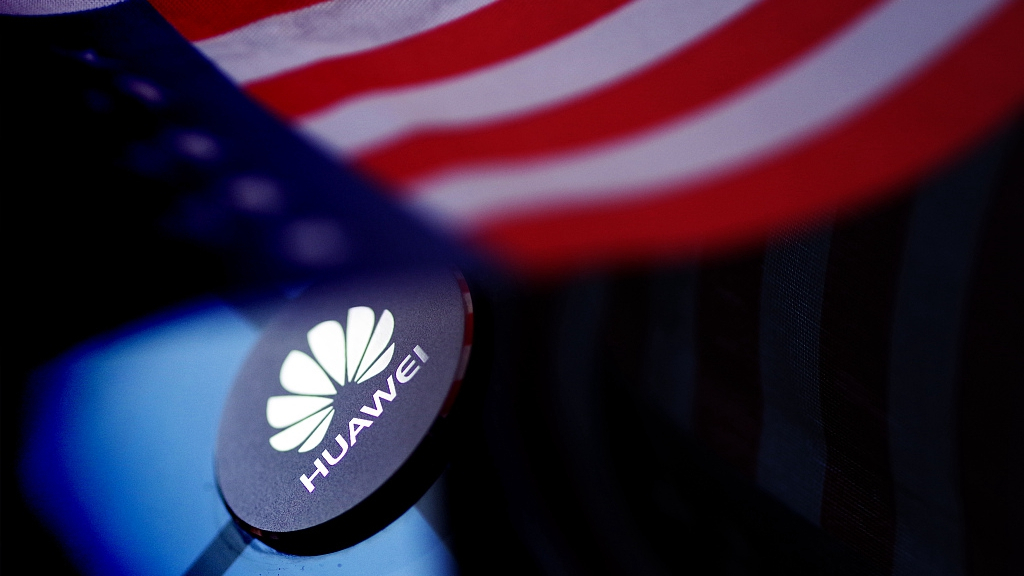
Editor's note: Chris Hawke is a graduate of the Columbia Graduate School of Journalism and a journalist who has reported for over two decades from Beijing, New York, the United Nations, Tokyo, Bangkok, Islamabad and Kabul for AP, UPI and CBS. The article reflects the author's opinions, and not necessarily the views of CGTN.
U.S. officials are debating the merits of measures designed to keep advanced technology out of the hands of China. They fear China is reverse engineering and stealing U.S. technology, giving the country an economic and military edge.
However, U.S. firms are pushing back against this plan to build a "Great Wall" around the nation's technology. The New York Times reports the firms and their proxies are arguing the efforts could "siphon expertise, research and revenue away from the U.S., ultimately eroding America's advantage."
The desire of the Donald Trump administration to protect U.S. interests in the world is legitimate, but will walling off China help the U.S. keep its technological, military and economic edge? The Times reports U.S. companies are claiming they "increasingly have no choice but to locate more research and development outside the U.S., to ensure that they have uninterrupted access to China, a fast-growing consumer market and the center of the global electronics supply chain."
The companies say this is already happening, with research money being funneled to Canada, Israel, the UK and other places.
In addition, China is intensifying its efforts to develop its own homegrown technology so it will no longer be dependent on U.S. companies for any products. Huawei, for example, is pouring money into its mobile phone operating system because of new U.S. laws blocking it from using Google's Android system. The end result will be that the U.S.-developed Android operating system will be challenged as the industry standard. This same pattern is at risk of happening with microchips, airplane parts, and eventually every field where the U.S. is currently a world leader.
The Trump administration claims that China is getting ahead of the U.S. by stealing technology. However, Huawei, for example, is leading the world in 5G telecom technology. Huawei doesn't have a U.S. competitor in this field. The US blames China's technological progress on cheating, but the better explanation is that China spent more money on research and development and offered more government support for the development of 5G and other industries.
The U.S. government thinks this isn't fair, and would like China to stop supporting strategic industries. That has no chance of happening. First, China needs to develop these industries to guarantee its own development, especially now in the face of threats from the U.S. to disrupt its supply chains. Second, the support that the Chinese government gives industries has been a winning strategy, with the country taking a global lead in areas like artificial intelligence. Third, the U.S. has no leverage that could induce China to stop.
The smart thing to do for the U.S. would be to follow China's lead and support the development of its own cutting edge research and industries. The major fear of the administration – that China is ripping off technology from the U.S. – could be dealt with in a trade deal.

Chinese made jackets are displayed for sale at a Manhattan department store, New York City, U.S., May 07, 2019. /VCG
Chinese made jackets are displayed for sale at a Manhattan department store, New York City, U.S., May 07, 2019. /VCG
The two countries can find common ground in their trade negotiations for better IP protection. As China makes more advances in technology, it has a greater interest in maintaining international property rights. For example, Huawei says it has offered to license its 5G hardware and software technology to a U.S. firm and allow that firm to build and deploy it.
What the U.S. will not be able to achieve in a trade deal is convince China to stop investing in home-grown research and technology, and stop supporting the development of its own companies.
The U.S. supported free trade for decades because it has brought great results for its economy and a leadership position in the world. Facing a strong competitor like China, the U.S. should double down on research and development, and not be afraid to support its own industries.
The US.. government has famously offered support to its banks and the auto industry. Why not support critical high tech sectors? If Washington had done this earlier, U.S. Attorney General William Barr would not be suggesting that the U.S. take control of Nokia and Ericsson to ensure the security of its 5G networks. Some people have suggested the U.S. could resume a place of world leadership by making massive investments in green technology. Wouldn't this be a more positive step than building ineffective walls around the country's economy?
How might U.S. support for high tech look? The Semiconductor Industry Association, a U.S. trade group, has called for tripling federal investment in semi-conductor specific research over the next five years and doubling federal funding for semi-conductor-related research annually across federal scientific agencies. It also calls for removing caps on green cards for qualified workers to meet the short-term demand for talent, and investing in education. It also calls for free trade agreements that remove market barriers, protect IP, and enable fair competition.
The Trump administration, however, is going in the opposite direction, again proposing massive cuts to science funding, putting limits on immigration, and eschewing multilateral trade agreements.
The Times reports that top administration officials plan to meet on February 28 to discuss whether to block General Electric's license to sell jet engines to China and other restrictions. You can be sure Airbus and GE's European competitors will be watching carefully for the results of this meeting.
(If you want to contribute and have specific expertise, please contact us at opinions@cgtn.com)